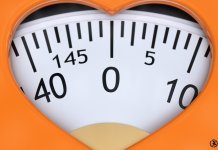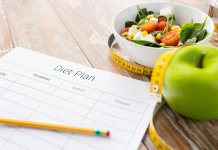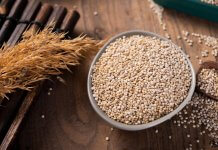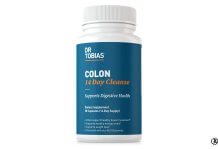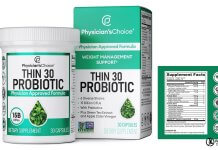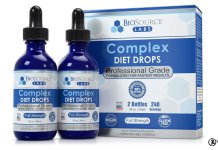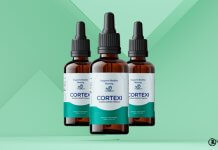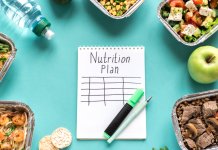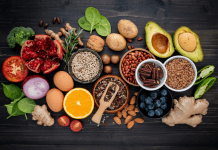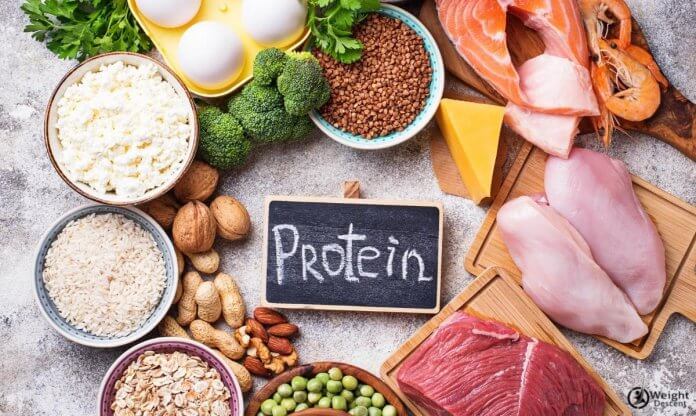I get commissions for purchases made through links on the site. As an Amazon and Clickbank Associate I earn from qualifying purchases. Learn more.
A high protein diet for weight loss is any diet that contains a higher proportion of protein than the standard daily requirements set by the FDA. These diets are commonly used to lose weight, build muscle or increase strength.
Estimated reading time: 9 minutes
Table of contents
High Protein Dieting Basics
- The body needs protein to survive. It helps keep organs healthy, builds muscles and other tissues, creates enzymes and hormones, transports nutrients through the bloodstream, builds antibodies against infection, and more. While some studies have shown that too much protein can be harmful to embryo development in pregnant women (and could lead to deformities), for most people getting enough protein on a daily basis is vital. This includes vegetarians who don’t eat meat but get their necessary proteins from plants sources such as beans and nuts.
- Protein is made up of amino acids which come in various forms. Some are essential, meaning that they have to be obtained from the diet or supplements because the body doesn’t produce them naturally. These include the nine needed by the human body: phenylalanine, valine, threonine, tryptophan, methionine, leucine, isoleucine, lysine, and histidine. Others can be synthesized by other amino acids through a biochemical process known as transamination.
- There are two main types of protein found in our diets: complete proteins and incomplete proteins. Complete proteins contain all nine essential amino acids while incomplete proteins lack one or more of the nine. The most common incomplete protein is soy which lacks methionine while rice lacks cysteine and tryptophan.
- Protein deficiency only occurs when the body has an inadequate supply of protein in relation to its metabolic needs. This can happen in people who are starving, who suffer from severe forms of malnutrition, or whose bodies require extra amino acids (protein building blocks) for various reasons (e.g., during infections, healing wounds after injuries or surgeries).
- The majority of protein consumed by adults comes from plant sources such as beans, nuts, and grains although seafood, dairy products, and meat all contain large amounts too. Most adults need roughly 50 g of protein every day with pregnant women requiring up to 60 g/day and nursing mothers slightly more – roughly 70 g. This varies depending on the individual’s weight, age, and activity level.
- Mediterranean Diet – The benefits of the Mediterranean diet go beyond the prevention of some dietary diseases such as heart problems, cancer, diabetes, and hypertension to general benefits including good mental health, good mood, and consequently a significantly longer life.
Complete vs. Incomplete Proteins
When considering a high-protein diet, it’s important to understand the distinction between complete and incomplete proteins. Complete proteins contain all nine essential amino acids that our bodies cannot produce on their own. These amino acids are vital for various physiological functions, including muscle growth, immune support, and hormone regulation. Sources of complete proteins typically include animal-based foods such as meat, poultry, fish, eggs, and dairy products. On the other hand, incomplete proteins lack one or more essential amino acids and are often found in plant-based sources like legumes, grains, nuts, and seeds. To ensure a well-rounded amino acid intake, especially for those following a vegetarian or vegan diet, it’s essential to combine different incomplete protein sources throughout the day to create complete protein profiles. This balance helps promote optimal health and supports the body’s various biological processes.
High Protein Foods and Weight Loss
Many people use high protein diets in their efforts to lose weight. It is important to note that when calories consumed are less than the number of calories burned, the body uses fat for energy. A caloric deficit can be created through a change in diet or an increase in exercise. The question is whether going on a high protein diet makes it easier to lose weight by itself. Studies have not provided clear-cut evidence that high protein diets help people shed pounds faster than other eating plans without increasing physical activity levels.
In some studies, participants lost slightly more weight when they switched from one diet to another (e.g., from low fat/high carbohydrates to higher protein). But this wasn’t always the case which means it’s not possible to say that high protein diets are superior to low fat/low-calorie ones without more research.
What we do know is that high protein foods tend to produce greater feelings of fullness and satiety (which helps control appetite) and maintain energy levels over longer periods of time compared with other types of food, which makes it easier for these individuals to stick with their diet plan.
Examples of high protein diet foods include:
- Poultry, lean red meat, and other types of meats low in fat.
- Soy products such as tofu.
- Eggs, dairy products, cheese, and other high calcium foods.
- Fish including tuna, salmon, herring, and mackerel.
- Beans, nuts, and other legumes.
- BioPls Slim Pro – The weight loss journey might be a hard one, but BioPls Slim Pro seems to be one of the few effective, reliable, and safe products out there that might be able to lend a hand.
Benefits of adopting a high protein diet
- Weight management: while it’s not clear whether a high protein diet can help keep extra pounds at bay by itself, people often lose weight on these plans because they contain fewer carbs and thus fewer calories. In other words, you can eat more of them since they make you feel fuller for longer;
- Metabolic alterations: this type of eating plan is associated with several positive changes in the body such as decreased blood sugar levels (due to slower digestion and absorption of proteins) and increased muscle mass (because your body is forced to use amino acids from food instead of its own tissue). Both factors result in better metabolic health;
- Heart benefits: most high protein diets tend to be low in saturated fat and cholesterol which means they may protect against heart disease and related conditions or symptoms;
- Improved digestion: high protein foods take longer to digest and leave the stomach so you experience less discomfort after eating.
Risks associated with a high protein diet
- Many experts believe that as well as helping people lose weight by controlling their appetites, protein-rich foods can contribute to better overall health. However, some wonder whether these beneficial effects are only present when the individual combines them with other healthy habits (e.g., exercising regularly/eating more vegetables). There is no definitive proof yet regarding this type of issue.
- High protein intake can cause some side effects such as increased urination and dehydration which is why individuals should drink lots of water (to avoid this problem) and not overdose on these diets.
- Patterns of eating like this can be hard to follow in the long term. Even though high protein diets may not be dangerous, experts believe they aren’t sustainable because people who cut back too much on carbs tend to crave them over time and gain weight once they go off their diet plan.
- Some experts believe that these types of food favor one type of organically produced nutrient over another (e.g., carbohydrates vs proteins). As a result, they caution against adopting high protein diets for life without considering other aspects related to our well-being or risk jeopardizing our overall nutrition.
- Diets that are too low in carbohydrates might increase bad cholesterol levels and also reduce blood sugar levels to a point where they become insufficient for certain individuals who have type 1 diabetes mellitus. These folks should always consult with their doctor before adjusting their food intake.
- High protein diets can cause kidney problems, mostly in individuals with pre-existing kidney conditions or those who regularly consume large amounts of meat and proteins on a regular basis (e.g., bodybuilders).
- In addition to potential kidney issues, some studies suggest that high protein intakes may play a role in the formation of gallstones although it isn’t clear whether this risk increases overtime or not, especially since one study found no association between these eating plans and gallstones.
- The high sulfur content of red meat might increase the risk of heart disease and other cardiovascular-related conditions for people who have had previous issues with cholesterol or blood pressure (hypertension). Eating red meat in moderation seems to be ok but it may not be appropriate for everyone.
- Daily Greens – Organic Superfood Powder Formula – The 34 organic superfoods and the presence of 11 extracts and herbs in the Daily Greens powder make it the worlds’ super healthiest food for health lovers.
Conclusion
Adopting a high protein diet for weight loss on a healthy lifestyle is something that has been observed for decades and many people have reported feeling better when they switched to high protein foods while some have also lost weight in the process. However, it’s important not to go on this kind of eating plan without first talking to your doctor since there are some serious health risks associated with this type of dietary pattern.
Frequently Asked Questions on High Protein Diet
A high protein diet (also called a protein-rich diet, high meat diet, or ketogenic diet) typically contains 25% to 35% of calories from proteins. This is in contrast to the RDA for most adults which recommends 10% to 15%. A typical high protein meal includes red meat, fish, and poultry that can be cooked in different ways (roasted, fried, or stewed). Some people may want to go on this type of eating plan in order to lose weight by controlling their food intake better but they should always talk to their doctor first before starting any new dietary pattern just in case.
You will need an individualized plan that is made by you and your doctor. Your physician will want to know how much weight you need to lose, what your current activity level is like (e.g., sedentary vs active) and will probably ask for at least one blood panel test to check on your overall health status before giving you the go-ahead. A high protein diet usually has an individual consume from 1,000 calories a day up to around 2,500 total calories if needed depending on results from bioimpedance analysis tests which can be purchased online or via medical supply stores online for home use.
Some healthy foods that contain a lot of protein include eggs, legumes (beans), nuts, seeds but it’s important to keep in mind that the percentage of fat in these foods is high and we should watch our intake of it. That’s why most experts recommend limiting total daily calories from proteins to around 30% to 40% at the maximum, especially for people who are very active (e.g., athletes). In this case, consuming enough carbohydrates on a regular basis can play a key role by providing the energy needed for activities.
Processed food items like ice cream or candy bars that contain a lot of sugar and saturated fats must be avoided entirely. It may be best to limit your consumption of red meat too because this type of food contains more bad cholesterol than white meat but fish is an excellent source of proteins and other nutrients.
Some people may just feel slightly fatigued or have a bit more difficulty digesting certain foods on a high protein diet but that should fade over time as your body adjusts to the changes in your dietary intake. You should talk to your doctor if you experience appetite loss, vomiting, diarrhea or any other severe symptoms do discuss whether it’s safe for you to continue with this type of eating pattern.



